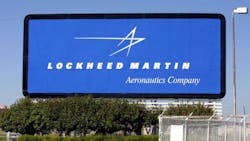Boeing, Lockheed Challenge US Bomber Contract Award
WASHINGTON—Boeing and Lockheed Martin challenged Friday the US Air Force's awarding of a huge bomber contract to Northrop Grumman, saying the decision was "fundamentally flawed."
Partners in the bidding for the multibillion-dollar contract to build the Long Range Strike Bomber (LRSB), the companies said the decision had not fairly weighed their commitment to keeping prices under control.
They filed a formal protest asking the U.S. Government Accountability Office (GAO) to review last week's contract award to Northrop.
"Boeing and Lockheed Martin concluded the selection process for the Long Range Strike Bomber was fundamentally flawed," the companies said in a joint statement.
"The cost evaluation performed by the government did not properly reward the contractors' proposals to break the upward spiraling historical cost curves of defense acquisitions, or properly evaluate the relative or comparative risk of the competitors' ability to perform, as required by the solicitation," they said.
Boeing, the world's largest aerospace company, and Lockheed Martin, the top U.S. defense contractor, said that their proposal "offers the government and the warfighter the best possible LRSB at a cost that uniquely defies the prohibitively expensive trends of the nation's past defense acquisitions."
The protest was widely expected after the Air Force announced last Tuesday that Northrup had won the contract, with an estimated value above $55 billion, for up to 100 of the bombers to replace the country's aging fleet.
Virginia-based Northrop insisted that its offer was more affordable and better-served the military's interest.
"Northrop Grumman Corporation is disappointed that its former LRSB competitors have decided to disrupt a program that is so vital to national security," company spokesman Randy Belote said in a statement.
The company's approach is "inherently more affordable and based on demonstrated performance and capabilities" and its record "stands in contrast to that of other manufacturers' large aircraft programs of the last decade," he said.
"As the only company to ever design and build a stealth bomber, we offered the best solution for our nation's security. We look forward to the GAO reaffirming the Defense Department's decision so we can continue work on this critically vital program."
Decision by February 16
The GAO has 100 days to review the process and issue a decision, putting the deadline at February 16, 2016.
A reversal against Northrop cannot be ruled out, said Loren Thompson, an industry specialist.
Thompson noted that Boeing had successfully challenged the Air Force's decision in 2008 to award a massive aerial tanker contract to Airbus, known at the time as the European Aeronautic Defence and Space Company, and its US partner Northrop.
According to Thompson, Boeing and Lockheed Martin have well-founded arguments in their favor for the bomber contract.
"There were fundamental errors in the selection process," he said. "It seems like the government did not correctly calculate the costs, nor did (it) assess correctly the risks of the proposals. "It did not follow the rules it set in the original request."
The future bomber, dubbed the B-3, is expected to enter operations between 2020 and 2030. The price of a single bomber is currently valued at $564 million.
The B-3 will replace the aging fleet of B-52s -- a Cold War era plane used extensively in the Vietnam War -- whose average age is 51 years, and B-1s, which entered service in the 1980s. Both are made by Boeing.
For Boeing, the bomber contract is "crucial" for its defense business, hit by a lack of orders for its F/A-18 and F-15 fighter jets, whose production timetables run only until 2017 and 2020, respectively, Thompson said.
Boeing also has been running behind schedule on the KC-46 tanker contract and has no replacement for its C-17 military transport plane, whose production is winding down this year.
"If Boeing does not win this contract, it will not manufacture fighters and bombers any more. It's crucial for them," Thompson said.
Copyright Agence France-Presse, 2015
About the Author
Agence France-Presse
Copyright Agence France-Presse, 2002-2025. AFP text, photos, graphics and logos shall not be reproduced, published, broadcast, rewritten for broadcast or publication or redistributed directly or indirectly in any medium. AFP shall not be held liable for any delays, inaccuracies, errors or omissions in any AFP content, or for any actions taken in consequence.
